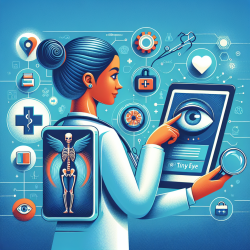Introduction
In today's digital age, e-health has emerged as a transformative force in healthcare, offering innovative solutions to enhance patient education and coping mechanisms. A recent study titled "Improving education and coping of scoliosis patients undergoing surgery, and their families, using e-health" highlights the potential of e-health strategies in empowering patients and their families. As practitioners, understanding and implementing these strategies can significantly improve outcomes for patients, particularly those undergoing complex procedures like scoliosis surgery.
The Study at a Glance
The study evaluated an e-health strategy designed to increase knowledge and coping skills among scoliosis patients and their families. Participants accessed a comprehensive, evidence-based scoliosis website, which provided information across various media formats. The study involved 74 patients and 71 parents, assessing their knowledge and coping mechanisms before and after engaging with the website.
Key Findings
- Both patients and parents showed significant improvement in their knowledge of scoliosis after using the website (p = 0.001 and p = 0.003, respectively).
- Parents demonstrated a slight increase in negative attitudes towards illness, possibly due to increased awareness of potential complications (p = 0.0002).
- Patients were more likely to use relaxing and solving family problems as coping strategies post-website exposure (p = 0.02).
- Despite increased knowledge, there was minimal impact on coping and perceptions of social support, indicating the need for additional interventions.
Implications for Practitioners
As practitioners, integrating e-health strategies into patient care can enhance educational outcomes and patient engagement. Here are some actionable steps:
- Incorporate Evidence-Based Resources: Use reputable e-health platforms to provide patients with reliable information, reducing misinformation and enhancing understanding.
- Facilitate Interactive Learning: Encourage patients to engage with interactive components of e-health resources, such as forums or Q&A sessions, to foster a supportive community.
- Combine E-Health with Traditional Methods: While e-health can enhance knowledge, traditional support systems and direct clinical interventions remain crucial for effective coping.
- Monitor and Evaluate: Regularly assess the impact of e-health interventions on patient outcomes and adjust strategies accordingly.
Encouraging Further Research
The study underscores the potential of e-health in improving patient education but also highlights areas for further research. Practitioners are encouraged to explore innovative e-health applications and their impact on various health outcomes. Collaborating with researchers to develop and test new e-health tools can lead to more comprehensive care strategies.
Conclusion
E-health represents a promising avenue for enhancing patient education and coping mechanisms. By integrating these strategies into practice, healthcare providers can empower patients and their families, ultimately leading to better health outcomes. For a deeper understanding of the study and its findings, practitioners can access the original research paper: Improving education and coping of scoliosis patients undergoing surgery, and their families, using e-health.










